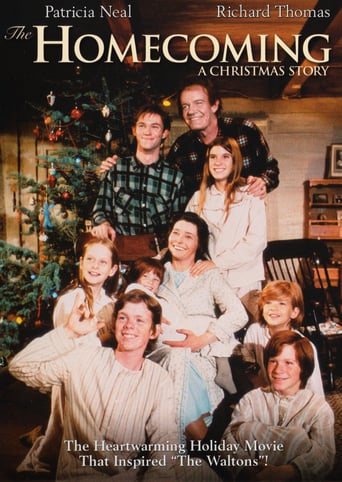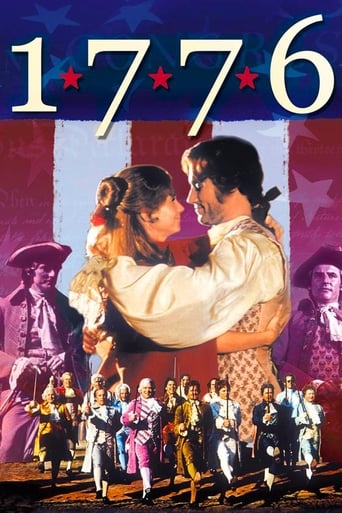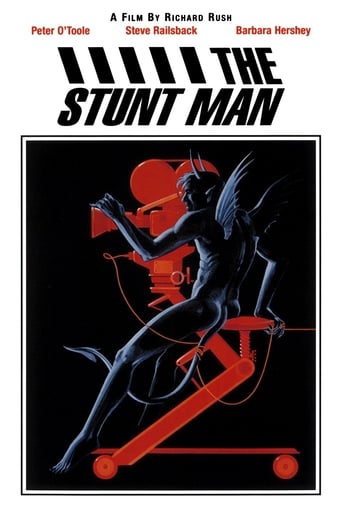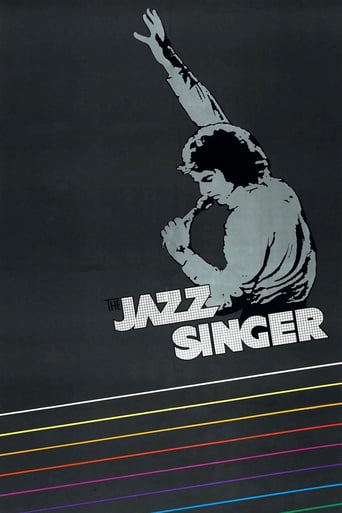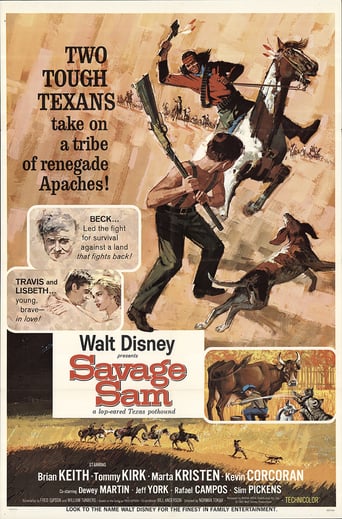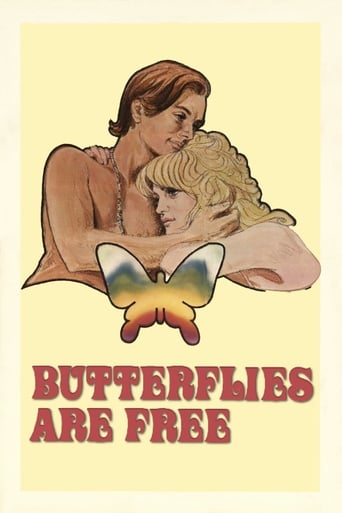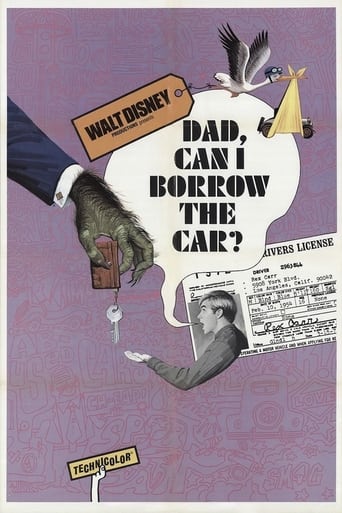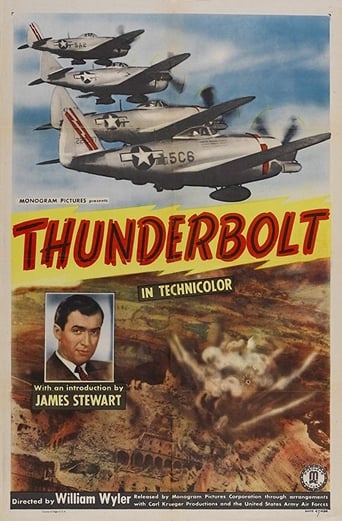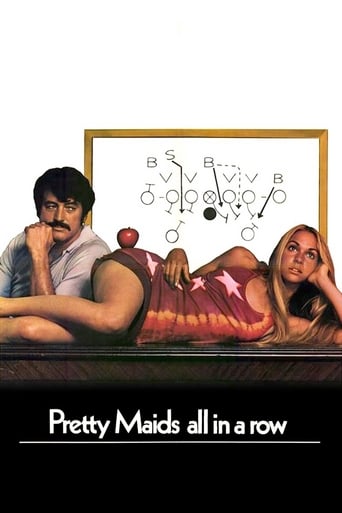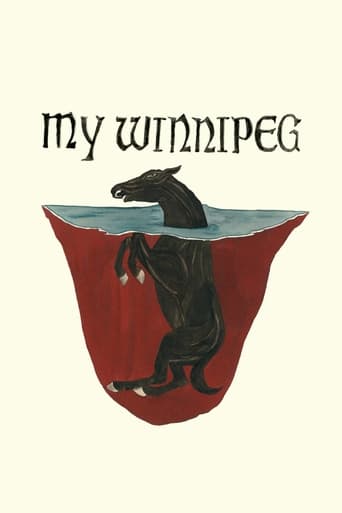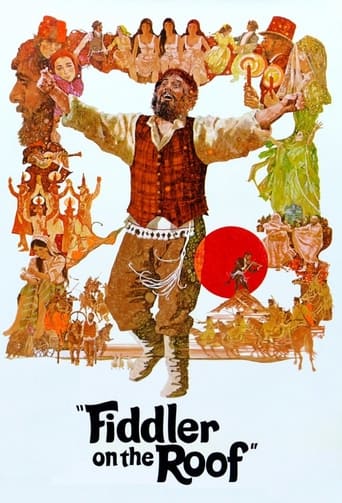


Fiddler on the Roof
In a small Jewish community in a pre-Revolutionary Russian village, a poor milkman, determined to find good husbands for his five daughters, consults the traditional matchmaker – and also has words with God.
-
- Cast:
- Topol , Norma Crane , Leonard Frey , Molly Picon , Paul Mann , Michele Marsh , Neva Small


Similar titles

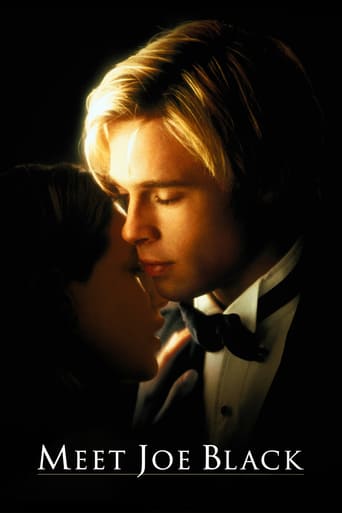
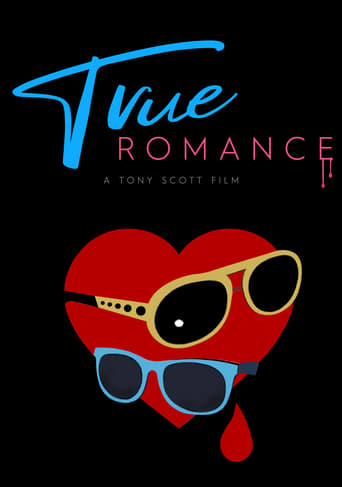
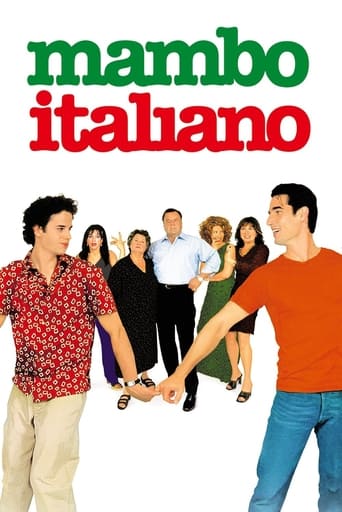

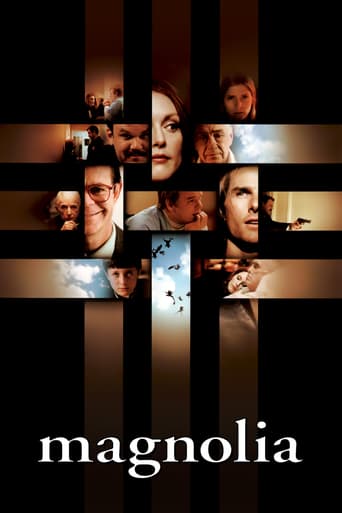
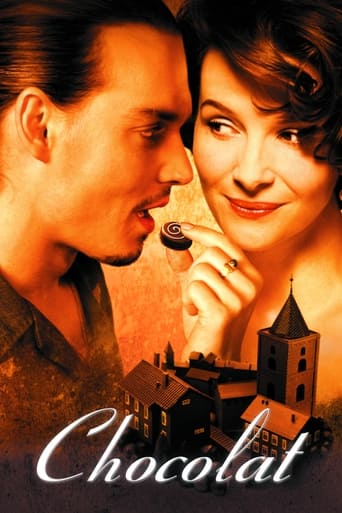
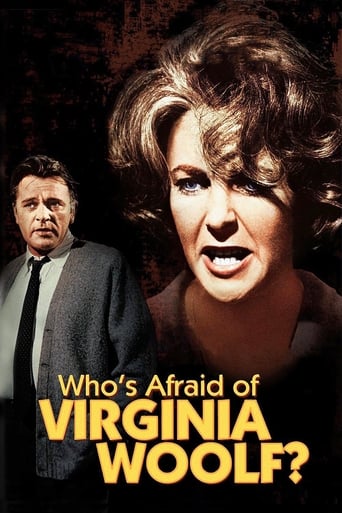
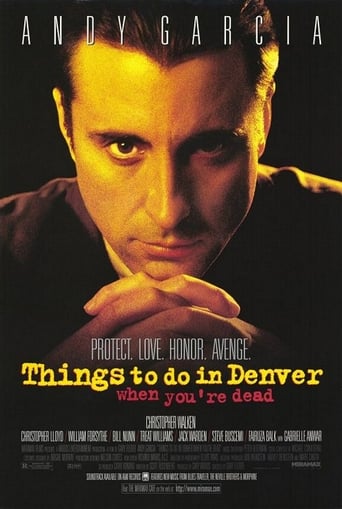

Reviews
Pretty Good
A lot of fun.
Exactly the movie you think it is, but not the movie you want it to be.
It’s not bad or unwatchable but despite the amplitude of the spectacle, the end result is underwhelming.
I love this movie; they do a good job integrating music with the action scenes. The music is very good in the movie. This movie is far from boring. It keeps you captivated. It is a good family movie about love., understanding, and acceptable; It is also about forgiveness and letting go. One can learn alot from this movie. The performances were great, especially the father, he is superb in this movie. Great cast and great film.
I am not generally a fan of musicals that have been adapted to the screen, but "Fiddler on the Roof" remains as one of the notable exceptions, thanks largely to the genius of director Norman Jewison ("In the Heat of the Night", "Moonstruck", "The Thomas Crown Affair, "Jesus Christ Superstar"), the endearing charm, vitality, and humanity of (Chaim) Topol, the ability of the rest of the cast to meet the elevated standard set by the lead, the innovative cinematography of Oswald Morris ("Lolita", "Oliver!", "The Entertainer", "Guns of Navarone") and the wonderful music, originally written by Jerry Bock and so capably adapted to the screen by John Williams.As to the excellent cast, note that there isn't one, single Hollywood superstar on the list, but they nevertheless succeed in creating one of the best musicals ever adapted to film and a movie that still survives on my list of favorites after many viewings. Personally, I would have loved to see Bea Arthur reprise her Broadway role as Yenta, but that's show business. Jewison's pick of Topol over Zero Mostel, however, was another one of his strokes of brilliance. Although Topol was mostly unknown outside of his native Israel, Jewison made a bold decision to cast him as Tevye, and this was only one example of the director's daring, innovative thinking that enhanced his directing and producing endeavors. He also agreed to cast Norma Crane as the female lead, Golde, who compliments Topol perfectly, even though I don't recall ever seeing her in a film other than her part as the mean and nasty town slut in "Tea and Sympathy" fifteen years earlier. Only Jewison had the ability to see her as "the perfect match" for Tevye. Right? Of course right!The story, based on the Yiddish short stories of Sholom Aleichem, is a familiar one for the Jewish people as they steadfastly struggle to hold to their traditions and values in the face of a rapidly changing environment that becomes increasingly hostile to their existence as both a religious and ethnic minority. As bad as conditions were for them during pre-revolutionary Russia and Ukraine, their situation would only worsen, especially when the Nazis came to power in Germany and conquered much of the rest of Europe only a few decades later.The fiddler in the play is a symbol of the perpetually precarious existence of Jews who have often depended upon the kindness of strangers throughout much of their thousands of years of history. Beyond the unique Jewish experience, the fiddler represents the universal fragility of all of our lives, regardless of our specific faith or ethnicity. Indeed, the uncertainties of life itself are like...they're like a fiddler on the roof!
I often wondered what it was like in the old country Russia/Poland one hundred plus years ago? What was the daily riggers of life for my Grandfather and his Father's before him? How did they survive? Their livelihoods, customs, down time?? How they lived or survived the rugged lifestyle with out the modern conveniences? Not to mention the racial tensions created by the local regimes of that time, mainly "antisemitism"? My Grandmother remembers the harsh winters in Lodz. My other Grandmother would describe the horrible senseless acts of a fearful group of individuals called the Pogroms. These tormentors would ride into the Jewish section on horseback with saber in hand and would slice the heads off the locals including woman and children. Just a small sample of the horrific acts by the government based group to annihilate the Jews of Europe. Despite the harshness of the living conditions, writer Sholom Aleichem presents the story of Tevya the Milkman and his family somewhere in the Ukraine at the turn of the twentieth century. Personally I saw this play performed for the first time at sleep away camp. Then I saw a professional production starring Hershel Bernardi as Tevya. My ex-Brother-In-Law played Tevya in his college production and the story is always captivating with song and dialogue. The film doesn't disappoint either as Topol plays a struggling milkman who tells his audience in a philosophical way his ideas on life as he looks toward the sky to ask G-d why things are? Tradition is most important to Tevya with out an explanation as to why? But because it's a tradition. Tevya has a wife of 25 years Golde (Norma Crane) does a capable job as the matriarch who cooks, cleans and has the Sabbath meal prepared unconditionally. They have five daughters but this story focuses on the three oldest and their love interests. First there's Tzeitel (Rosalind Harris).This was at a time when it was customary in Jewish law to have an arranged marriage done my a Matchmaker (Molly Picon)Yente. Grey,middle aged Lazar Wolf (Paul Mann)is looking for a second wife and Tzeitel fills the requirements under strong suggestion to the austere Tevya. Meanwhile Tzeitel is secretly meeting love interest Motel the tailor(Leonard Frey) and they want to be married but timid Motel has to tell Tevya that despite his hopes of a rich in-law, Motel and Tzeitel have a mutual love for each other and pay no heed to traditions. One of my personal favorite songs is Wonder of Wonders performed by Leonard Frey as his marriage will be a reality with a concocted dream by Tevya to pacify Wolf and Golde. The dream sketch was cleverly done in black and white. The second daughter Hodel (Michele Marsh) falls for a wondering radical Perchick (Paul Michael Glazer) who wants to go to Moscow and start a Marxist revolution against the Czar. Our third front or daughter is the Ginger haired Chava (Neva Small), who is an avid reader and meets a gentile boy who she eventually falls in love and marries against the wished of her parents as Tevya professed that his daughter is dead to him. Powerful scene in any production of the play. The songs are so familiar and the story on paper, serious in nature is still pleasant to watch. Our character do sprinkle a bit of humor despite the tense political climate brewing in Czarist Russia. Note Norma Crane who played Golde was in bad health during the film yet her performance was a adequate.The kind of play you can get lost in as you see your Jewish ancestry played out literally. Other cultures would ask what Judaism entails? I say watch this play and you'll get quite an education about Diaspora. How millions of Jews Emigrated to the United States because of racial problems and changing governments which prohibited certain religions. You'll enjoy the story and learn a few things about the Chosen People.
To celebrate my 1600th review for this site I turn to another of my favourite films. Like a number of other cinematic genres, such as the war film and the Western, the traditional Hollywood musical was to go into something of a decline in the late seventies, but the early part of the decade had seen two very fine examples, "Fiddler on the Roof" and "Cabaret". "Fiddler" is set in the Russian village of Anatevka in 1905. Actually, Anatevka is really two villages, one Jewish and one Christian, and there is little interaction between the two. Nearly all the main characters are drawn from the Jewish community.It amazes me that anti-Semites have sometimes attempted to brand Jews "rootless cosmopolitans", as Jewish communities have always struck me as very conscious of their roots, their traditions and identity. The film, like the Broadway musical on which it is based, can be seen as an exploration of the role of tradition in Jewish life. In the opening song, actually entitled "Tradition", the main character Tevye explains the importance of tradition to him and his neighbours. Several Jewish traditions, including a wedding and a Sabbath meal, are reproduced in the film.The film, however, also shows how the traditions which Tevye holds so dear are being challenged from within and threatened from without. Within Anatevka and the wider Jewish community the younger generation are starting to question the values which their parents have lived by. The threat from outside comes from state-sponsored anti-Semitism in the form of the pogroms. The film's title comes from a line of Tevye's; he compares the predicament of Russian Jews to that of a fiddler on the roof, desperately trying to keep his footing and to play a merry tune while in a precarious situation. Tevye intends this as a metaphor, but an actual fiddler appears in the film at various points.The story is a simple one. Tevye, a poor village milkman, and his wife Golde have five daughters but no sons. The three elder girls are all of marriageable age (the younger two are just children), and all three find husbands who, in one way or another, represent a breach with tradition. Tzeitel, the eldest, would rather marry her childhood sweetheart Motel, a poor tailor, rather than the wealthy but elderly widower found for her by the village matchmaker. Hodel, the second daughter, falls in love with Perchik, a politically radical student, and stands by him even when he is exiled to Siberia for his part in a demonstration. And the third daughter, Chava, wants to marry a Gentile. (Motel and Perchik are both Jewish). Marrying outside the faith is a step too far for Tevye, even though his love for his family has led him to give his blessing to Tzeitel and (rather reluctantly) to Hodel. He refuses Chava his permission to marry, and disowns her when she defies him by marrying her beloved in a Christian ceremony.There are a number of reasons why I have long regarded this as one of the greatest, perhaps the greatest, of all screen musicals. The first is that the songs (music by Jerry Bock, lyrics by Sheldon Harnick) are very fine ones. They range from the rousing ("Tradition", "To Life!") to the deeply moving ("Sunrise, Sunset", "Far from the Home I Love") to the humorous ("Matchmaker, Matchmaker"), although the humour is sometimes rather dark. The song "If I Were a Rich Man", for example, contains some humorous descriptions of Tevye's imagined life if he were to become rich, yet is also a complaint addressed to the heavens against his poverty.The second reason why I love this film is the performance of Topol in the central role. Tevye is the dominant figure in the film, not only its main character but also its narrator, addressing the audience directly. Topol, only 36 at the time, was considerably younger than the part he was playing; Tevye, the father of three adult daughters, is probably supposed to be at least ten years older. The makeup department do a good job in making him look older, but Topol nevertheless brings a younger man's energy and vitality to the part, making a Tevye powerful, larger- than-life figure. He also has a fine singing voice. There are too many good supporting performances to mention them all, but I must single out Norma Crane as Golde, Leonard Frey as the timid Motel and a pre-"Starsky and Hutch" Paul Michael Glaser (here billed simply as "Michael") as the idealistic Perchik.My final reason for loving the film is the direction of Norman Jewison. (According to one story, he was only given the job because he was wrongly thought to be Jewish because of his surname). The original Broadway production was dominated by bright colours, inspired by the art of Marc Chagall, but the look of the film is much more realistic; the only time it veers into fantasy is during Tevye's dream sequence. (Location shooting actually took place in Yugoslavia, about the only part of Eastern Europe where American film crews would have been welcome in 1971). I think that this was the right decision; what works well on stage is not always the right choice in a film. Jewison's sombre photography helps to anchor the film in a particular place and time but also adds to its timeless appeal. The villagers of Anatevka are people we can identify with, who speak to us through the years about the problems of their own time and of ours. (Nobody can watch the film without being uncomfortably aware that in years to come the Jewish population of Eastern Europe were to suffer tribulations far worse than anything the Tsarist regime could devise). Jewison, Bock, Harnick and all those involved with the film invest it with the universality which is the hallmark of all great art. 10/10

